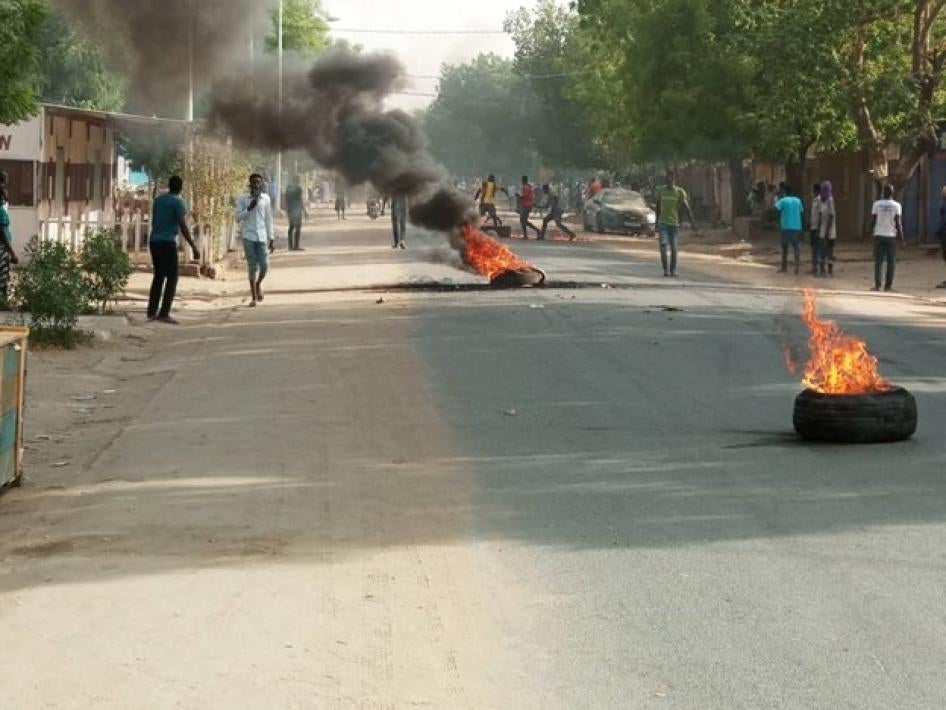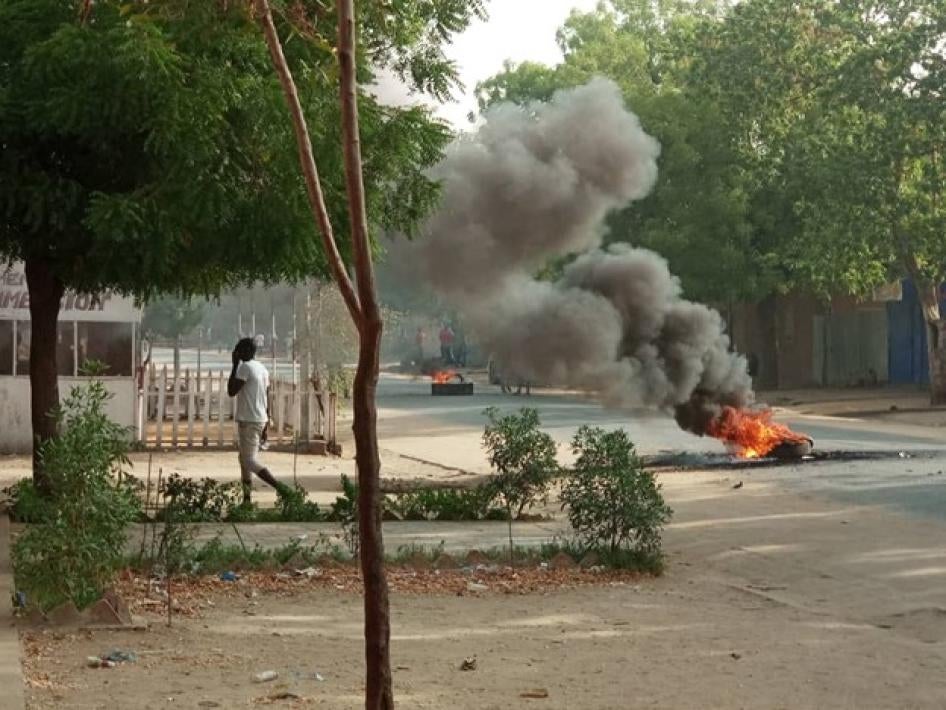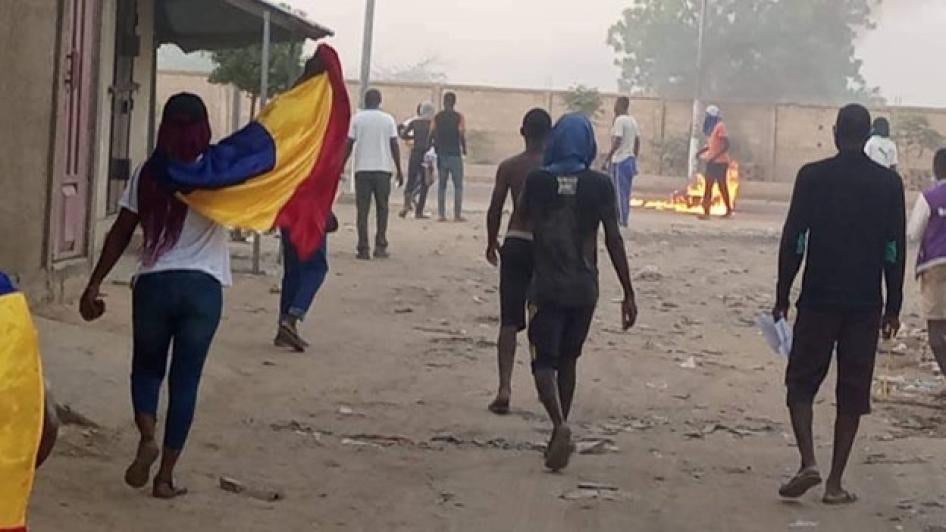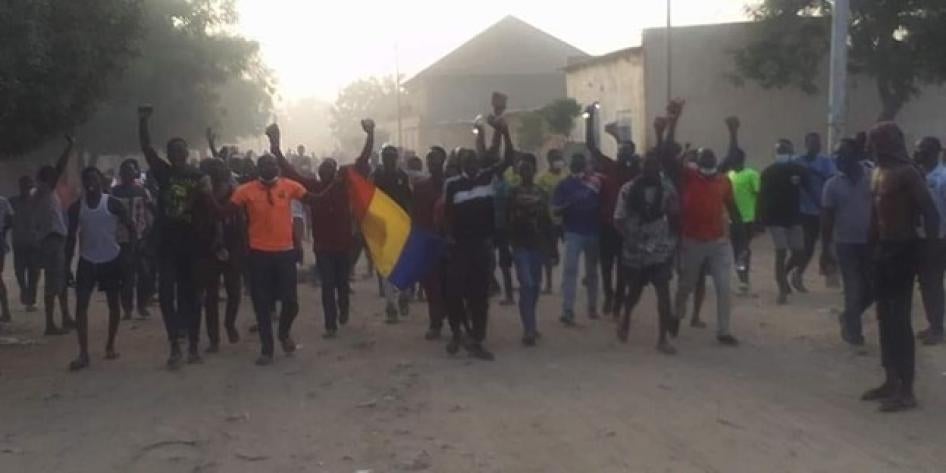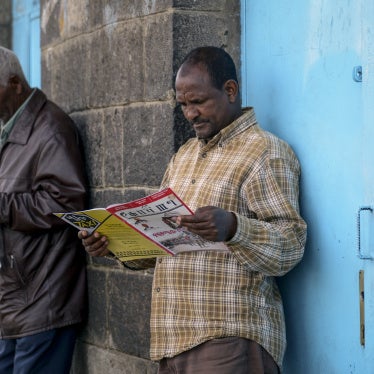(Nairobi) – Security forces in Chad have used excessive force, including indiscriminate live ammunition, to disperse opposition-led demonstrations across the country in the aftermath of the April 11 election, Human Rights Watch said today. During protests in late April and May, at least seven people were killed, dozens were wounded, and security forces arrested more than 700 people, several of whom reported ill-treatment, including torture, in detention.
Tensions have been high in Chad since President Idriss Déby’s unexpected death, reportedly from injuries during clashes between rebels and government forces in the Western Kanem province. The army announced his death on April 20, the day after his reelection to a sixth term in an election the opposition largely boycotted due to widespread violence and repression. A transitional military council led by Mahamat Idriss Déby Itno, Déby’s son, took over the country on April 20, but the council is facing both national and international criticism amid growing calls for a civilian-led transition and credible elections.
“Chad’s brutal repression of opponents, dissidents, and other residents is likely to push the country toward further instability,” said Ida Sawyer, deputy Africa director at Human Rights Watch. “The authorities should immediately stop security force abuses and hold those who have used excessive force against peaceful protesters accountable.”
Hundreds of members and supporters of opposition parties and civil society organizations united under a coalition known as Wakit Tama, “the time has come” in Chadian Arabic, and other residents demonstrated in N’Djamena, the capital, as well as in Moundou, Doba, and other cities across the country, on April 27 and 28, May 8, and May 19. The protesters challenged a transitional military council ban on demonstrations and demanded a transition to civilian rule. They also agitated against France’s initial support for the military takeover and its perceived interference in Chadian political affairs.
Transitional military authorities on April 28 said that six people died during the April 27 demonstrations, without specifying the locations or circumstances. Civil society groups stated that 15 people died and 36 were injured during the April 27 and 28 protests across Chad.
Based on telephone interviews with 45 people between April 29 and May 27, including six protesters and bystanders wounded by security forces during the demonstrations, Human Rights Watch documented seven deaths, including six men killed in N’Djamena and one in Moundou, and seven people injured in N’Djamena and Doba. Interviewees included seven formerly detained protesters and 20 other witnesses to abuses and relatives of victims as well as 12 medical workers, journalists, members of opposition parties, and civil society representatives. Human Rights Watch corroborated victim and witness accounts with medical records, official statements by the transitional military council, photographs, and video.
On June 11 Human Rights Watch shared its findings and requested responses to specific questions in an email to Mahamat Ahmat Alhabo, the justice minister. He did not reply.
Witnesses and family members said that security forces, including the police and soldiers, were largely responsible for the killings and injuries. In two cases, victims were killed by unidentified armed men in civilian clothes who arrived at the protests around the same time as the security forces, in unmarked vehicles, and who fired at civilians in the presence of uniformed security forces members, who did not intervene.
Security forces and other authorities also arrested, threatened, and intimidated witnesses and protesters, including victims who were being treated at health facilities.
Police shot and killed Adouksouma Balama Mathieu, a 26-year-old student who participated in the April 27 demonstrations in N’Djamena’s Walia neighborhood. “Police fired teargas and warning shots in the air but failed to disperse us,” said a witness. “We burned tires and threw rocks at them. Then they fired live rounds at some 20 to 30 meters from us. Balama got a bullet in the thigh, but police kept firing.” Human Rights Watch confirmed the circumstances of Balama’s killing with another witness and a family member.
Some protesters attacked security forces and damaged public and private property. In an April 28 statement, the transitional military authorities reported that demonstrators had killed a female police officer and destroyed 15 security force vehicles and two gas stations in N’Djamena on April 27. Human Rights Watch also learned that a crowd of protesters severely beat a gendarme on April 27 in Moundou.
According to N’Djamena’s prosecutor, media reports, and the spokesperson for the United Nations High Commissioner for Human Rights, security forces arrested more than 700 people in relation to the April 27 and 28 demonstrations. Members of Chadian human rights groups and lawyers informed Human Rights Watch that most of them have been released, but at least 10 remained detained at the N’Djamena central prison as of June 23, including on charges of destruction of public and private property, public disturbance, illegal demonstration, and violence.
Human Rights Watch estimated that security forces beat more than 50 people who had been arrested before transferring them to various police stations, based on accounts from lawyers and members of human rights groups who spoke to Human Rights Watch.
On May 5 the newly appointed justice minister Mahamat Ahmat Alhabo told Radio France Internationale that the prosecutor should open an investigation into the arrests, deaths, and injuries of protesters during the April 27 and 28 demonstrations. The minister added that the judicial authorities should promptly deal with these cases and immediately release detainees if there are no charges against them.
Regional and international actors have condemned Chadian security forces’ excessive use of force against protesters and called for accountability for abuses. They include the French President Emmanuel Macron and the Congolese President Felix Tshisekedi in an April 27 joint statement, the African Union’s special rapporteur on human rights defenders on April 29, the Office of the High Commissioner for Human Rights on April 30, and the European Parliament on May 19.
International law, African human rights law, and Chad’s transitional charter protect the rights to freedom of expression and assembly and prohibit excessive use of force by law enforcement officials. The United Nations Basic Principles on the Use of Force and Firearms provide that security forces may use force only in proportion to the seriousness of the offense and that the intentional use of lethal force is permitted only when strictly unavoidable to protect life.
“Authorities should immediately end security force abuses and allow for peaceful protests as part of the democratic process,” Sawyer said. “Those now in office, with support from regional and international partners, should ensure a swift and peaceful transition to civilian rule, and allow for the organization of credible, free, and fair elections.”
For more details and accounts from survivors and witnesses, please see below.
Protesters, Bystanders Killed
According to witnesses and family members, of the six killed in N’Djamena, two were shot by the police, one by the presidential guard, two by unidentified men in civilian vehicles that arrived at around the same time as security forces, and one by an officer some witnesses said was a customs officer. Police shot and killed the one person in Moundou, whose killing Human Rights Watch documented. Six killings occurred on April 27 or April 28 and one person was shot on May 8 and died from his wounds on May 11.
April 27 Killings in N’Djamena, Moundou
Uniformed presidential guard soldiers killed a 19-year-old man demonstrating in N’Djamena’s Gassi neighborhood. Human Rights Watch spoke to two witnesses and a relative of the victim and reviewed a video, filmed by one witness, showing the victim minutes after he was shot. This witness said:
The police fired a lot of teargas to disperse us, and we struggled to breathe. Some people fainted. Soldiers from the presidential guard came with three vehicles and fired live ammunition at us. One soldier got out of his vehicle with his weapon. He walked toward us and fired a round of bullets. Then he stopped, aimed at the young man from about 200 meters, shot him, and left, jumping back into his vehicle.
I went close to the young man to help him. He had been shot near the belly button. We carried him on our shoulders. A police vehicle stopped in front of us, and we asked the policemen to take him to the hospital. They refused without giving any explanation. We eventually found a car, but the young man died before we reached the hospital.
Unidentified people firing from civilian vehicles in N’Djamena killed at least two men, including a 19-year-old protester who was a student. Human Rights Watch spoke to a relative of the student and two witnesses to his killing. His friend witnessed and described the shooting:
We went out to demonstrate, and there were many of us. The police were overwhelmed and called for reinforcements. Soldiers came and fired warning shots in the air to disperse us. At the same time, or shortly after, a civilian vehicle, a Toyota V8 Land Cruiser, without license plates and with smoked windows, came and parked some 200 meters from us. Someone from this vehicle rolled down the window and started shooting at us. That is how my friend was shot: three times. One bullet in the left side, one in the right elbow, and another one on the right thigh. The soldiers were there [standing nearby] but did not do anything to stop the individual from shooting.
The parents of a 22-year-old student spoke to Human Rights Watch about their son, who was shot in the buttocks and stomach in N’Djamena’s Walia neighborhood. The victim’s father said that the medical staff at N’Djamena’s central hospital brought his son home because soldiers had surrounded the hospital in search of injured protesters. He died shortly after being taken to another health facility.
Human Rights Watch was unable to speak with any witnesses to the killing, but reviewed a video filmed by a witness of the student bleeding on the ground. The parents also said that witnesses reported to them that the shooter was a customs officer, but Human Rights Watch was unable to verify that.
Police shot at close range a 21-year-old man in Moundou. Human Rights Watch spoke to two witnesses to the killing and a relative, and reviewed photographs showing his injuries as well as his medical records and death certificate stating gunshot wounds as the cause of death. The photographs and medical records were consistent with accounts provided by the witnesses and the family member. A 43-year-old teacher saw a police officer shoot the man in the left shoulder from about five meters away. The witness ran toward the man, but he died immediately.
Fatal Shooting on May 8 in N’Djamena
A police officer shot a 32-year-old protester at close range in N’Djamena’s Morsal neighborhood. The man died from his injuries on May 11 in a hospital. Human Rights Watch spoke to a relative of the victim and two witnesses. The victim’s friend and fellow demonstrator witnessed the shooting: “The police fired teargas. A teargas canister fell into a small house made of straw and my friend, with others, tried to extinguish the fire. Everyone ran but [the victim], so a police officer shot him twice – in the abdomen and in the left thigh – from about 10 meters away.”
Human Rights Watch reviewed two photographs: one of the victim’s wounds in the immediate aftermath of the shooting and the other of him bandaged at the hospital.
Protesters, Bystanders Injured
Shootings on April 27 in N’Djamena
Uniformed riot police shot a 32-year-old musician and civil society leader, Djasrabé Kimassoum, better known as “Ray’s Kim,” in his left thigh in N’Djamena’s 7th district as he was demonstrating with about 100 other people. Ray’s Kim said he felt targeted because of his leadership role:
The police blocked our way and fired teargas at us. In addition to the police, there were [uniformed] soldiers, gendarmes, and even customs officers deployed. A policeman took a Kalashnikov, got down on his knees, and shot. I think he deliberately targeted me because I was leading the demonstration. I realized I had been shot when I saw blood coming from my thigh.
Human Rights Watch reviewed three photographs sent by Ray’s Kim showing him at the hospital and his wound.
Riot police shot a 27-year-old protester in N’Djamena’s Walia neighborhood. The victim said:
A policeman got down from his vehicle, stopped me, charged his weapon, and pointed it at my chest. I lifted my hands up in a sign of surrender. I said, “I am not armed.” He let me go. But another policeman, who was also in the same vehicle, said, “Liar!” and shot me at close range in my left leg. He was 30 to 50 meters from me. He had a helmet on his head and was in uniform. He was from the Mobile Intervention Group [Groupement mobile d’intervention, a riot police unit]. He targeted me.
Human Rights Watch reviewed a photograph sent by the victim showing his bandaged leg.
Shooting on April 28 in N’Djamena
A man in civilian clothes sitting on the passenger side of a white Toyota Land Cruiser with smoked windows opened fire on a small group of protesters in N’Djamena’s Walia neighborhood, injuring a 23-year-old student. Nearby police did nothing to stop the shooting or catch the shooter. The victim said:
The individual rolled down the window, took a Kalashnikov, and started firing at us at close range, about 10 times. There were 10 police vehicles stationed six to seven meters from there; they saw what happened and did nothing. It was like there was an agreement between them and the man shooting from the Toyota. After the individual fired at us, his vehicle went away. I was hit by one bullet. It entered from my neck and exited from the jaw.
Human Rights Watch also reviewed photographs sent by the victim showing his injuries to the neck, near the jaw, as well as his medical records stating he received treatment for gunshot wounds. The hospital staff informed the victim his injuries were not too serious.
Shooting on May 19 in Doba
A 23-year-old student told Human Rights Watch that police fired teargas and live bullets to disperse about 50 protesters on the streets in Doba. The student said: “The police fired at us from 50 to 60 meters away. I got a bullet in my left side [in the abdomen]. I fell. A policeman came to me, put me on his vehicle, and took me to the gendarmerie brigade, where the commander ordered to transfer me to the hospital.”
Human Rights Watch spoke with the victim and reviewed photographs showing his wounds, and medical records from the Doba district hospital stating he received treatment for gunshot wounds.
Protesters Arrested, Beaten
April 27 in N’Djamena
Security forces arrested people demonstrating in N’Djamena and searched houses to arrest opposition members and civil society activists. The security forces beat many of those arrested before transferring them to various police stations in the capital. Human Rights Watch spoke to three former detainees and three lawyers who visited detainees at these police stations.
“Soldiers fired teargas in the courtyard of my home and broke in to arrest me in front of my family,” said a member of the opposition party Convention for Democracy and Federalism (Convention pour la démocratie et le fédéralisme) who was arrested but released after four days. “They hit me several times with the butt of their rifles and slapped me.”
An 18-year-old protester said that police arrested him in N’Djamena’s Gassi neighborhood and then beat him with a wooden stick until his wrist became swollen.
May 8 in Doba, N’Djamena
Police arrested at least 35 people, including three women, in Doba as they prepared for a demonstration. Human Rights Watch spoke to three former detainees who said that uniformed police and men in civilian clothes, suspected to be from the intelligence agency, intimidated and beat them up at Doba central police station, and detained them in degrading conditions. They said the women and a sick man were released the same day, but the others were released on May 11.
A 33-year-old woman said: “The police beat me savagely. The regional police delegate said, ‘Today, we are going to finish you.’ Six policemen forced me and two other women to take the push-ups position. They surrounded us and, in this position, they beat us. Each police officer beat us at least 10 times or more with a rubber whip.”
The victim sent Human Rights Watch both photographs showing scars consistent with her account and medical records from a private clinic in Doba stating she received treatment for contusions and bruises on her back, legs, and face.
“Before the police put us in the cell, they poured urine on the floor,” said a 28-year-old man arrested in Doba. “It was disgusting. Then, they pulled us out one by one and beat us.” He said that the police officer beat his face, hands, and neck with a whip, and then four others, two dressed in civilian clothes and two in police uniforms, beat him with their hands and feet for about 30 minutes.
Human Rights Watch reviewed a photograph showing the victim’s swollen and red left eye and medical records from Doba’s provincial hospital stating the man had been beaten and received treatment for contusions and bruises.
An activist who was arrested in N’Djamena said:
[Security forces] gave me a choice: to admit that I had taken to the streets because I had been manipulated and, in this case, they would let me go, or to admit that I had acted consciously and, in this case, they would arrest me. I replied that I took to the streets voluntarily. So, they arrested me.
May 19 in N’Djamena
“They insulted me and told me I was a ‘bastard,’” said a 33-year-old member of the opposition party Les Transformateurs, who was arrested by gendarmes and soldiers, and detained for several hours at the police station in N’Djamena’s 13th district. “They handcuffed me and beat me with their hands and with wooden sticks. They put me down, my stomach on the floor, and in this position, they kicked me with their boots.”
Protesters, Witnesses Threatened
Authorities and security forces threatened and intimidated injured protesters and those who witnessed security force abuses.
A civil society activist who witnessed the April 27 killing of the 19-year-old student, said that a senior member of the national intelligence agency and a senior member of the government summoned him for meetings on April 27 and 28 respectively, and tried to force him to provide a false account of the student’s death. During the April 28 meeting, he said both officials were present:
They told me not to mention that soldiers were around when someone from a civilian vehicle shot my friend. They asked me not to say that the military failed to prevent the incident. But I could not sell my conscience. I refused to accept their version. This was not taken very well, and when I walked out from the minister’s office, in the courtyard, soldiers caught me and beat me up on the head for several minutes with the butt of their guns. It was a warning, an intimidation.
Human Rights Watch reviewed three photographs sent by the activist showing bumps on his forehead.
A 30-year-old witness to the April 27 killing of a 19-year-old protester in N’Djamena’s Gassi neighborhood described above said that he received threatening anonymous calls after sharing his account on Radio FM Liberté. He believes those making the threats work for the government. He said the first caller said: “If you continue like this, you’ll get kidnapped and killed. If you want to save your life, stay home and don’t speak out.” The second caller warned him to “stay home and silent.”
A civil society activist said that security forces have had him under surveillance since he participated in protests:
Since I took part in the first anti-Déby demonstrations in February, I have been tracked down by the intelligence services. They told me I should be careful and refrain from mobilizing the youth. On April 27, eight police vehicles surrounded my home. Police tried to break in, but I ran away through the back of my house.
